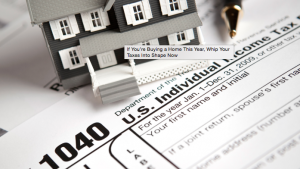
But if you’re looking to buy a home, you’ll want to try a different tack—the higher your reported income, the bigger the home loan you’ll qualify for. So if you’re planning to buy a house in the next year or two, you may want to be less aggressive about claiming write-offs.
As Brian Decker, a loan originator with Guaranteed Rate, puts it: “Is paying an extra few thousand dollars in state and federal taxes for the year worth it to become a homeowner?”
We’ll leave that up to you and your financial adviser to decide. But if you want to look worthy in the eyes of a mortgage lender, you’ll need to do some legwork on your taxes, starting now. Here’s what you need to know, no matter what your situation.
If you’re self-employed
Pay attention to large deductions, such as those for a home office or business vehicle that can significantly reduce your reported income. For big, one-time deductions, be sure to save your documentation (you’ll need it for the IRS anyway), and explain to your lender the circumstance that reduced your income in that year. You can also assuage their concerns by having a larger cash cushion or by putting down a bigger down payment.
If you’ve just recently gone freelance, you may also run into issues getting approved for a mortgage if you don’t have a track record to demonstrate your earning potential.
“It doesn’t matter how much experience you have in a field, once you strike it out on your own, we need to see two years of self-employed income,” says Mike Lyon, vice president of operations at Quicken Loans.
If you’re on staff
Workers with W-2s typically have an easier time getting approved than those who are self-employed, but keep this in mind: Any write-offs on your Form 2106 for unreimbursed business expenses will be deducted from your salary.
If you got a new job that doesn’t appear on your tax returns, ask your employer to provide a verification of employment letter, which can reassure the lender that you’re good for the income stated on your application.
“As long as you’re in the same field and your earnings are roughly the same, we’re comfortable with job changes,” says Dave Norris, an executive vice president with loanDepot.
Workers whose tax returns show that they were unemployed for a significant period of time in the past two years may also run into trouble, since lenders want to see a consistent two-year work history. Be ready to explain any long employment gaps.
If you’re claiming rental income
Just as your business expenses will be deducted from your salary, any write-offs you take on a rental property will be deducted from your rental income.
Lenders will look at your Schedule E to verify the amount of rent you collect (showing them a lease won’t cut it), and determine how much you spend on the property. Deductions for depreciation don’t count against you.
We know—forgoing some of those tax deductions might make you cringe a little. But just think of the tax breaks you can get once you’re a homeowner, and it’ll all be better soon.